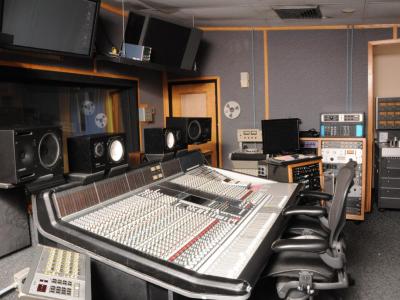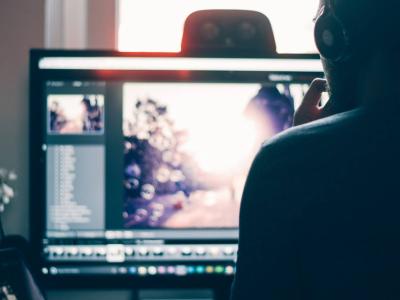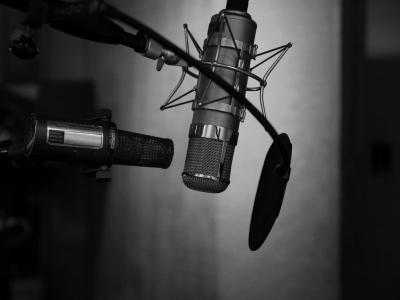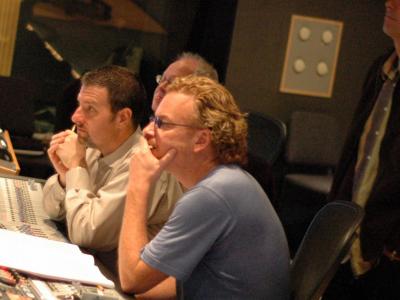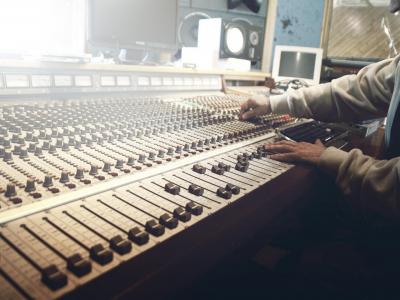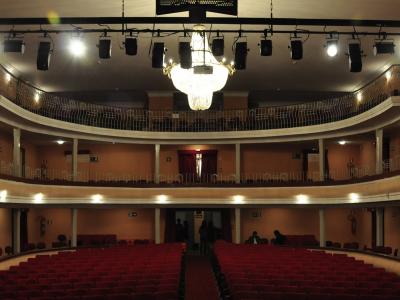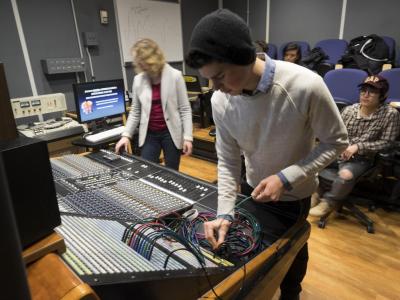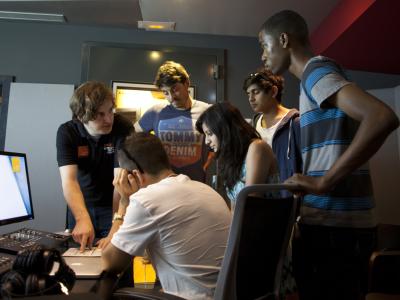This graduate-level music production course centers on creative recording and advanced editing as expressive tools. You’ll shape emotionally impactful recordings across instruments and environments, applying multi-mic techniques, critical listening, and detailed DAW editing to translate artistic intent into polished, professional results.
Key Learning Outcomes
- Record and edit commercially competitive performances using advanced DAW workflows and critical listening skills
- Design and execute creative recording strategies that align technical decisions with emotional and musical objectives
- Apply multi-microphone and instrument-specific recording techniques to capture tone, clarity, and performance nuance
- Prepare polished recordings for mixing and mastering by evaluating fidelity, balance, space, and emotional impact
Course Description
Are you prepared to enroll in this graduate course?
Take Audio and Recording Fundamentals and Mixing Techniques self-assessments to check your readiness for this material.Creative Recording and Editing Techniques in Music Production is a practical, in-depth study of essential and creative recording techniques as well as an exploration of advanced audio editing techniques and considerations. You will learn to maximize the emotional impact of recordings by focusing on the music-driven intersection of the technical and creative skills necessary to achieve professional sounding recordings in any setting, from professional recording environments, to portable studios with minimal gear. You will learn core and creative editing techniques meant to expand, repair, and maximize the emotional potential of any recording. You will also envision detailed aural objectives and expand your recording vocabulary and expertise in order to determine frequency, dynamic, spatial, ensemble, and arrangement choices in recordings.
By the end of this course, you will be able to:
- Calibrate listening environments and reference mixes to support accurate recording and editing decisions
- Record and edit instruments, including drums, percussion, bass, and guitars, using performance-aware workflows
- Apply advanced vocal and overdub recording techniques, including layering, comping, and special effects
- Evaluate recordings during final production stages to balance technical precision with emotional intent
Syllabus
Lesson 1: Purpose of Music/Purpose of Music Production
- Philosophy and Review: Recording - Purpose, Definitions, and Important Considerations
- The Human Microphone - The Limits of Our Hearing
- An Engineer’s First Questions–What Are We Recording?
- What Is the Emotional Objective?
- Assignment 1: Choosing Your Recording Project
Lesson 2: Listening Environment and Recording Drums
- Calibrating Our Ears and Listening Environment - A Practical Approach
- The Paramount Importance of a Reference Mix
- Workflow Efficiency in the DAW
- Importing Reference Mixes and Preparing for Recording
- Recording Level and Gain Staging
- Assignment 2: Analysis and Signal Flow Testing
Lesson 3: Producing Drum Tracks
- Tuning
- Drum/Cymbal Choice
- Performance Considerations
- Drum Editing
- Assignment 3: Recording or Programming Drums
Lesson 4: Percussion and Loops
- What Are We Recording?
- What Is the Emotional Objective?
- Anticipating Symbiotic Issues
- Mic Choice Considerations (Dynamics, Condensers, and Ribbons)
- Percussion Editing
- Assignment 4: Recording Percussion
Lesson 5: Bass
- DI or Amps or Both
- Upright Bass
- Other Low Frequency Instruments
- Assignment 5: Recording Bass
Lesson 6: Guitars
- Electric Guitars
- Acoustic Guitars
- Guitar Editing
- Assignment 6: Recording Guitars
Lesson 7: Keyboards
- Hardware
- Software
- Electric Pianos and Hardware Synthesizers
- Acoustic Pianos
- Software Synthesizers
- Keyboard Editing
- Assignment 7: Recording and Editing Keys
Lesson 8: Horns and Miscellaneous Instruments
- Exploring Textures
- Vocals: Lead
- Vocal Editing
- Assignment 8: Recording Pads
Lesson 9: Vocals
- Backgrounds
- Special Effects
- Correct Vocal Setup
- Recording Duplicate Layers
- Advanced Vocal Editing
- Assignment 9: Recording Vocals
Lesson 10: Recording and Editing
- Recording Special Effects
- Recording with Varispeed
- Reamping Interesting Spaces
- Editing Special Effects
- Assignment 10: Final Project
Lesson 11: Emotional and Technical Check-In During the Final Stages of Production
- Technical and Emotional Considerations
- Preparing the Final Recording for Mixing and Mastering
- Open Forum
- Assignment: Final Project
Lesson 12: Next Steps
- Review and Synthesis of the Topics Covered in the Course
- Areas of Improvement
- Final Course Reflections
Requirements
Ready to submit an unofficial copy of your transcript?
Submit TranscriptPrerequisites and Course-Specific Requirements
Prerequisite Courses, Knowledge, and/or Skills
Completion of Microphone Techniques, Recording and Producing in the Home Studio, and Advanced Mixing Techniques or equivalent knowledge and experience is required.
In order to be successful in this course, you should have the following background prior to enrolling:
- Multi-track production experience working with a Digital Audio Workstation, such as Pro Tools, Logic, Cubase, Digital Performer, Traktor, or Ableton *Please note that Pro Tools is the software officially required for the course
- Access to basic, high-quality equipment to record and produce music (DAW, microphone(s), audio interface, monitors, headphones, plug-ins, etc.)
- Experience programming software-based MIDI instruments
- Experience recording multi-microphone acoustic instruments (such as drums or multi-instrument ensembles)
- Experience collaborating on projects as a music producer/engineer
- Ability to write effectively and clearly when conveying information and ideas
Textbook(s)
- No textbooks required
Recording
- Students will need to find 4-6 musicians who they will collaborate with, and record for various projects.
Software
- Pro Tools (Intro or Artist editions not sufficient)
Hardware
- MIDI controller
- Audio interface, with a minimum of 8 mic preamps
- One of the following combinations of 8 XLR microphones:
- Option 1:
- 4 dynamics (one of these should be appropriate for kick drum and bass, such as the Shure Beta 52A)
- 2 matched pairs of condensers (4 total)
- Option 2:
- 5 dynamics (one of these should be appropriate for kick drum and bass, such as the Shure Beta 52A)
- Matched pair of condensers (2 total)
- 1 ribbon
- Option 1:
- Professional-quality studio monitors (pair), as well as necessary cables
- Over-ear studio headphones (advanced tier or higher)
- iLok USB required to use Pro Tools offline. iLok Cloud (free) may be used instead, but requires a continuous internet connection while using Pro Tools.
Important Technical/System Considerations
- At least 50 GB unused storage space
Student Deals
After enrolling, be sure to check out our Student Deals page for various offers on software, hardware, and more. Please contact support@online.berklee.edu with any questions.
General Course Requirements
Below are the minimum requirements to access the course environment and participate in Live Classes. Please make sure to also check the Prerequisites and Course-Specific Requirements section above, and ensure your computer meets or exceeds the minimum system requirements for all software needed for your course.
Mac Users
- macOS Monterey 12.0 or later
PC Users
All Users
- Latest version of Google Chrome
- Zoom meeting software
- Webcam
- Speakers or headphones
- External or internal microphone
- Broadband Internet connection
Instructors
Author & Instructor
Having graduated from Berklee College of Music in 1999, Enrique Gonzalez Müller embarked on a career as a music producer and engineer at the renowned Plant Studios. His talent led him to collaborate with influential artists such as Joan Baez, the Dave Matthews Band, members of Metallica, Joe Satriani, MC Hammer, DJ Quik, Too $hort, Stewart Copeland and Les Claypool, to name a few. In his native Venezuela, Gonzalez Müller has produced numerous chart-topping albums for acclaimed bands including Caramelos de Cianuro, Desorden Público, and Viniloversus. His partnership with Los Amigos Invisibles resulted in the band's first Latin Grammy Award for their album "Commercial" in 2009, followed by a Grammy nomination in 2018 and a second Latin Grammy win in 2020. Internationally, he made significant contributions in Switzerland, composing for the contemporary dance company Prototype Status and in Italy, by producing, recording, arranging, and mixing albums for renowned artists such as L’Aura and Elisa. His collaboration with Elisa, Tina Turner and UNICEF on the hit duet "Teach Me Again", reached the number one position on the charts. In the United States, Gonzalez Müller continued collaborating with iconic names including Nine Inch Nails, Victor Wooten, Kronos Quartet, Jason Newsted (ex-Metallica) and Wynton Marsalis.
In 2010, Gonzalez Müller expanded his attention and creative curiosity towards education. Initially as a volunteer faculty for the Prison University Project at San Quentin State Prison in California and later in 2012, joining Berklee College of Music as a full time faculty member in the Music Production and Engineering department. Recognized for his innovative approach to education, Gonzalez Müller received Berklee's Distinguished Faculty Award in 2015 and in 2018 became the program director of the master's degree program in music production for Berklee Online. In 2021, he founded The Pedagogy Arts Collective at Berklee, a pan-college, international initiative fostering holistic excellence in the science and art of education across diverse disciplines, showcasing his commitment to elevating educational standards on a global scale. Read Less
What's Next?
When taken for credit, Creative Recording and Editing Techniques in Music Production can be applied towards the completion of these related programs:
Related Certificate Programs
Related Degree Major
Questions?
Contact our Academic Advisors by phone at 1-866-BERKLEE (U.S.), 1-617-747-2146 (INT'L), or by email at advisors@online.berklee.edu.

